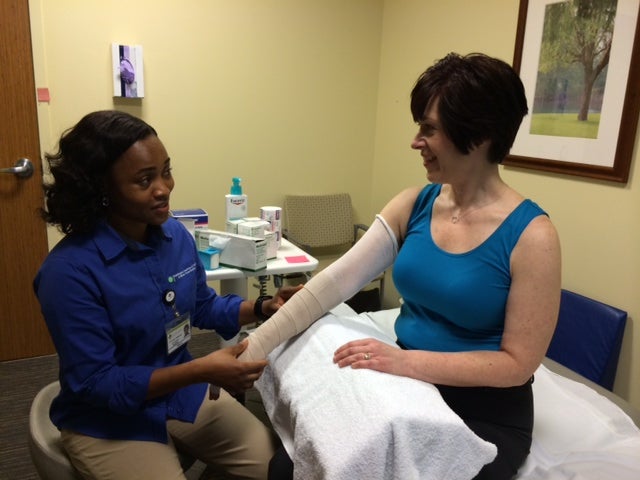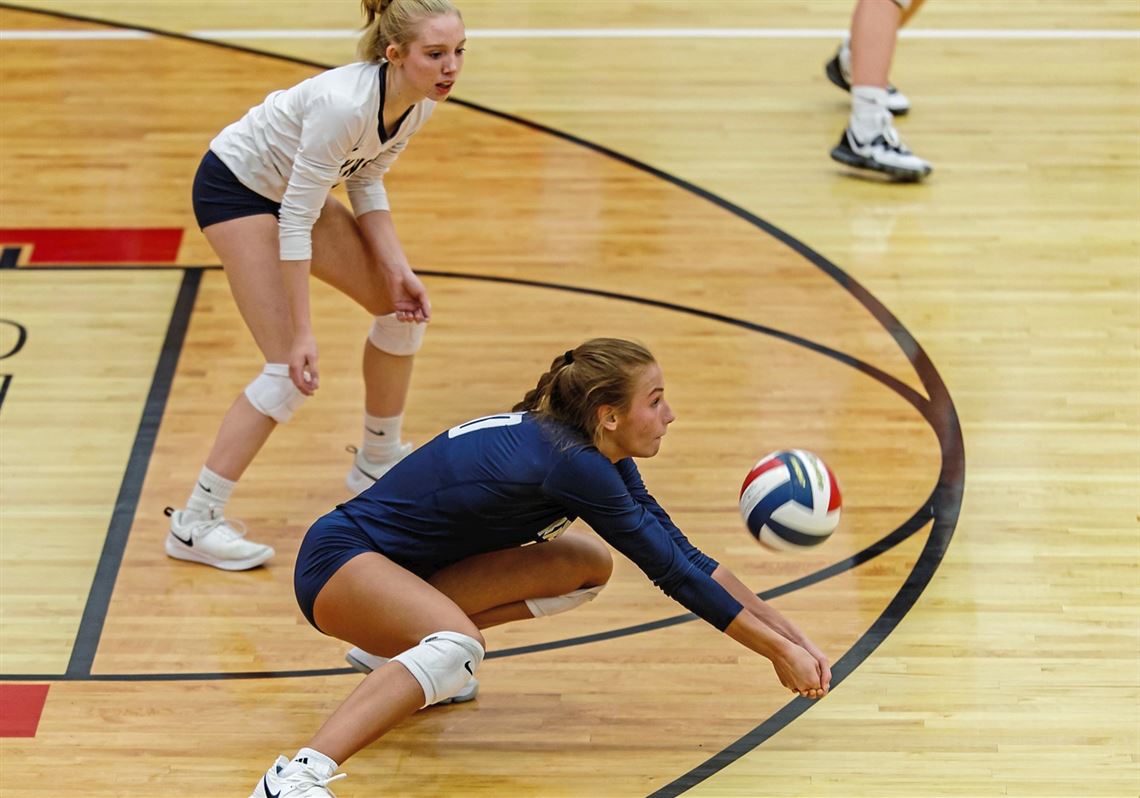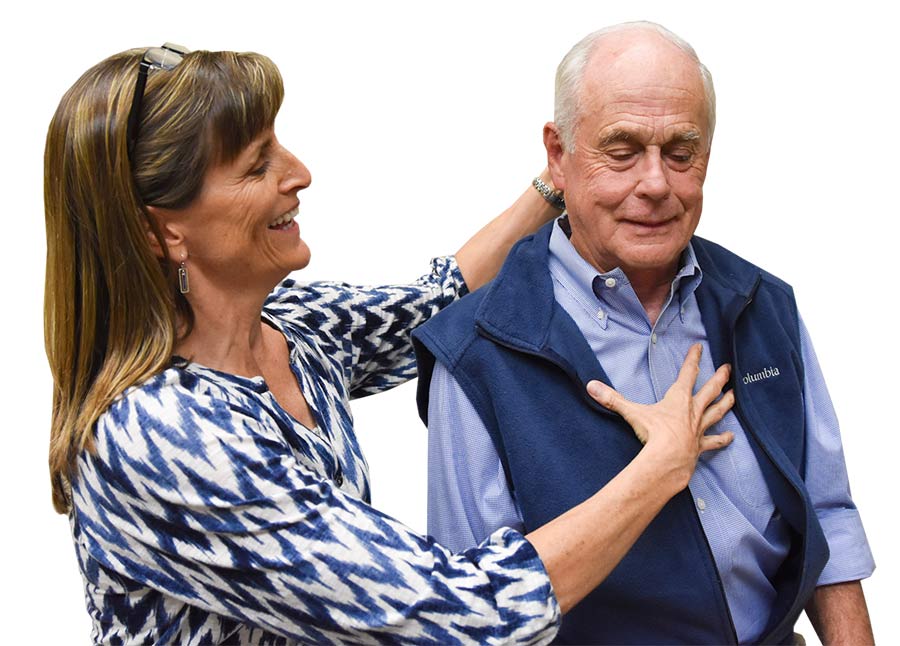
Breast Cancer & Lymphedema
Rehabilitation & Treatment
Core Physical Therapy evaluates your cancer-related problems and creates a treatment plan that gets you back to your best self.
Breast Cancer And Lymphedema
Breast cancer and/or the treatment for breast cancer may cause problems that would benefit from physical therapy. These problems include:
Cording or Axillary Web Syndrome
Cording refers to the rope or cord-like structure that develops under the skin of the arm. This may be due to surgery or lymph node removal/biopsy. You may be able to feel a cord under your skin although in some cases, you may not be able to feel it externally but will notice pain and tightness in that area. It often starts under the armpit and may run down to the inside of the elbow and occasionally even lower. Cording may limit your ability to lift your arm overhead causing problems with functional activities.
Mobility and Strength Deficits
Sometimes mobility deficits occur after breast cancer surgery. These deficits usually affect the shoulder limiting your ability to reach overhead. You may also experience specific weaknesses to your arm or general weakness from the cancer treatment.
Cancer-Related Fatigue Syndrome
Cancer-related fatigue interferes with your daily activities and is one of the most common side effects of cancer treatment (National Cancer Institute). It is a distressing persistent feeling of fatigue or exhaustion that interferes with daily activities. Symptoms may include boredom, exhaustion, lack of motivation, difficulty with functional mobility, loss of appetite, and difficulty concentrating. Exercise is extremely beneficial and has been found to improve the quality of life by increasing physical energy, appetite, and the ability to more easily perform daily activities.
Lymphedema
Lymphedema is chronic swelling caused by the failure of the lymphatic system to drain fluid properly. Lymphedema is estimated to occur in 20% of women who undergo lymph node dissection (Cancer.org). It may occur due to lymph node removal, radiation, chemotherapy, or tumor growth in the lymph nodes or lymphatic vessels. Treatment for lymphedema may include manual lymphatic drainage, diaphragmatic breathing, compression bandaging, compression garments, education on skincare, exercise, and aerobic conditioning.
Why Choose Core Physical Therapy for Your Cancer Rehabilitation?
Brenda Miller has been treating people with breast cancer since the early 2000’s. She is certified to treat general and breast cancer lymphedema and problems related to cancer. She understands this is an extremely trying time and will devise a plan for your recovery but also wants your input to allow for the best outcome. At Core Physical Therapy, we offer individual rooms for privacy and low patient volume so you do not feel rushed during your visits.
Let Core Physical Therapy help with your cancer rehabilitation and get you back on track.
Treatments for Cancer-Related Rehabilitation
Cording
We offer manual therapy that includes gentle massage and myofascial release to reduce pain and improve mobility. We will teach you specific exercises to complement the manual work in order to stretch the cord and restore mobility to the shoulder.
Mobility and Strength Deficits
Physical therapy can be extremely helpful in restoring strength and mobility. We will measure your range of motion and test your strength during the examination. Manual therapy may be indicated to treat muscular and joint restrictions followed by a flexibility program to improve your range of motion. We will establish an individualized strengthening program based on the findings from your exam.
Cancer-Related Fatigue Syndrome
Physical therapy may improve your stamina and concentration, lessen your fatigue, and improve your ability to perform normal daily tasks. We will help you start and maintain an exercise program that begins slowly and increases over time. The therapist will complete a full examination and put together a program depending on what activities are important to you. Our treatments will include mobility and strengthening exercises, aerobic activities, core strengthening, postural education, balance work, and manual therapy. We will help you incorporate exercise into your life in a way that works for you.
Lymphedema
During your physical therapy exam, measurements of your arm will be taken followed by an assessment of your strength and mobility. A large portion of your first visit will be education on what lymphedema is, the “do’s” and “don’ts” and what to expect during your course of therapy.
If you have significant edema, you may benefit from a manual technique called manual lymph drainage. This is a light lymphatic massage that helps drain the lymphatic fluid from the congested to the healthy areas.
Compression bandages are often used in conjunction with manual lymph drainage. These bandages are called short stretch bandages. Although they look similar to ACE bandages, they offer more compression as the muscles pump against them while you are moving and less compression when you are at rest. The bandages are layered in order to allow lymphatic flow to move from bottom to top. The goal with the compression bandages is to reduce the swelling to a manageable level and then you can be fitted for a compression garment.
A compression garment is a light elastic sleeve used to maintain the size of the arm. It can be used in very mild cases or after the edema plateaus from using the compression bandages. Your therapist will discuss what is most appropriate for you.
We will instruct and encourage you with exercises and aerobic activities after manual lymph drainage and while bandaged to further reduce swelling. Performing exercises while bandaged is much more effective than without the bandage as it allows the muscle to press against the bandage assisting with muscle pumping. Swimming is also an excellent exercise choice because the water provides pressure on the lymphatics and the muscles pump to help with lymph flow.
Meet The Core Physical Therapy Team

Brenda Miller PT, MPT, OCS, CLT, CMTPT
Owner & Physical Therapist
Brenda Miller is the founder and owner of Core Physical Therapy. She earned her Bachelor of Science degree in Exercise Science from Pennsylvania State University, then completed her master's degree in Physical Therapy from Arcadia University in Glenside Pennsylvania.

Morgan Chocklett PT, DPT
Physical Therapist
Morgan Chocklett earned her Bachelor of Science Degree in Exercise and Health Promotion from Virginia Tech (GO HOKIES!!) and her Doctorate of Physical Therapy from Mary Baldwin University. She is thrilled to be back in Blacksburg and flaunt her maroon and orange!

Kate Buss, DPT
Physical Therapist
Kate Buss earned her Bachelor of Science Degree in Human Nutrition, Foods, and Exercise from Virginia Tech and her Doctorate of Physical Therapy from Virginia Commonwealth University.

Maria "Peti" Tibung, PT, DPT
Physical Therapist
Maria “Peti” Tibung earned her Bachelor of Science Degree in Physical Therapy from the University of the Philippines and her Doctorate of Physical Therapy from Shenandoah University.
Articles Related to Cancer Rehabilitation
Do You Experience Knee Pain When You Run?
DO YOU EXPERIENCE KNEE PAIN OR SNAPPING TO THE OUTSIDE OF YOUR KNEE WHEN YOU RUN? IS RUNNING DOWNHILL PAINFUL? If you answered yes to any of these questions, one potential problem may be iliotibial band syndrome....
Core Physical Therapy Specializes In
Running Injuries
Running injuries are common whether you are a novice or competitive runner. Training errors, inappropriate footwear, mechanical faults, weakness or flexibility may be the issue. At Core Physical Therapy, we provide a comprehensive evaluation that addresses posture, strength, shoe wear, flexibility and range of motion. Your running will be videotaped and analyzed for mechanical faults. Following the exam, you will learn about potential causes for your pain and how to treat it with exercises, changes in shoe wear or specific suggestions on how to improve your running mechanics
CrossFit Injuries
CrossFit has become extremely popular over the past twenty years. The program emphasizes cardiovascular endurance, stamina, strength, flexibility, power, speed, agility, and balance. Occasionally, Crossfit athletes suffer an injury due to training errors or improper technique. The physical therapists at Core are trained to assist CrossFit athletes by improving their technique or any deficits they may exhibit with strength, flexibility, or joint mobility. Videotape analysis may be used to break down movement patterns to better assist with improving technique.
Student Athletes
Core Physical Therapy works with many student-athletes from Virginia Tech and the local elementary, middle, and high schools who injure themselves while participating in their sport. The athletic background of the physical therapists gives them a better understanding of what is required to return to competitive athletics. We treat overhead athletes such as volleyball, tennis, baseball, and softball players as well as gymnasts, runners, swimmers, bikers, and soccer players among others. Common injuries involve the shoulder, back, knee, and ankle. We try our best to accommodate the student-athletes schedule by offering early morning and late treatment hours.
Post Surgery Rehabilitation
If conservative management is unsuccessful in relieving pain and disability, surgery may be an option. The quality of physical therapy following surgery will greatly impact recovery. At Core Physical Therapy, we take your recovery very seriously. We make it a point to understand what was done surgically and will communicate with the surgeon as needed. Common surgeries seen at Core include but are not limited to ACL reconstructions, meniscectomies, spinal fusions, discectomies, carpal tunnel repairs, labral repairs, rotator cuff repairs and joint replacements to the shoulder, knee, and hip.
Dizziness | Vertigo | Balance Difficulties
The prevalence of falls increases with age. Vision, strength, sensation, and the inner ear (vestibular system) work together to maintain balance and equilibrium. If any of these systems are not functioning optimally, dizziness, and poor balance may result in increasing the risk of falls and severely impacting the quality of life. At Core Physical Therapy, an evaluation will be performed to determine the cause of the imbalance or dizziness. Treatment will be implemented to address the deficits to restore balance and resolve the dizziness.
Breast Cancer And Lymphedema
The number of cancer survivors continues to increase in the USA due to better treatment. Breast cancer is one of the most common cancers among women. Cancer and the treatment for cancer may lead to problems such as scar tissue and mobility restrictions, weakness, cancer-related fatigue syndrome, cording (axillary web syndrome), and lymphedema (post-cancer edema). At Core Physical Therapy, we have a certified lymphedema specialist who is able to address these issues with lymphatic manual drainage, bandaging, exercises, manual work, stretching, and cardiovascular conditioning.
Helpful Links

922 University Blvd, Suite 204
(Behind Macado's Restaurant)
Blacksburg VA 24060
Copyright © 2023 Core Physical Therapy
Website design & development by
Carbon Six Digital Marketing Agency





